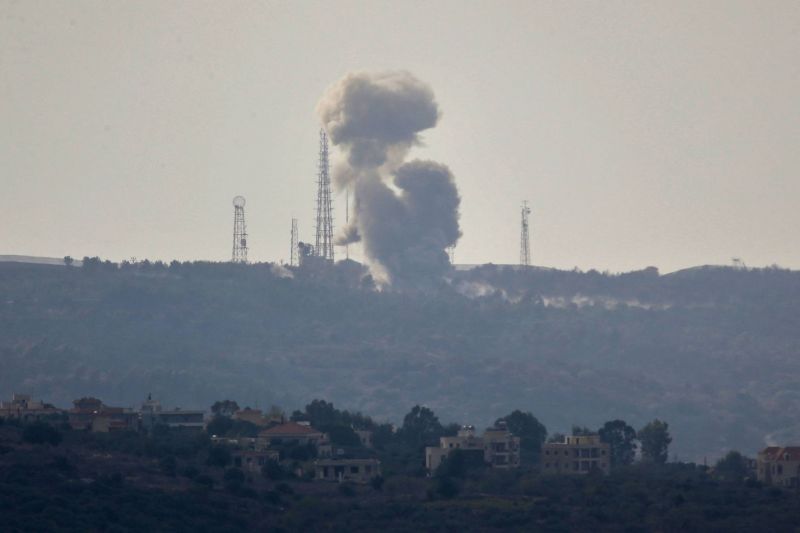
A plume of smoke rises following Israeli artillery shelling on the outskirts of Alma al-Shaab, along Lebanon's southern border with northern Israel on Nov. 13, 2023, amid the ongoing battles between Israel and the Palestinian group Hamas. (Credit: AFP)
Since Oct. 15, a week after the start of clashes between Hezbollah and Israel on the southern border, the Israeli Army has burned Lebanese forests, olive groves and other agricultural land, often with white phosphorus bombs. This military practice has been described as a "scorched earth policy" by caretaker Minister of Environment Nasser Yassin. Last week, Yassin announced Lebanon's intention to "lodge a documented complaint" against the attacks, which are prohibited by international law and have already destroyed 4.6 million m2 of woodland, 20 hectares of olive groves and 20 hectares of century-old olive groves (some 40,000 olive trees).
Who can submit such a claim and to which legal bodies? Given the ongoing financial crisis, and the government’s inability to compensate farmers for their losses, what chance does Lebanon have of receiving reparations for the chemical attacks? We asked Rizk Zgheib, Associate Professor of International Law at Saint Joseph University (USJ).
Q- When is a strategy described as a "scorched earth policy?"
A- This is a military tactic whereby one side involved in a conflict deliberately destroys another's resources, means of production or the surrounding environment. When such destruction is intentional rather than collateral damage, it is a violation of international humanitarian law.
Q- Israel has not ratified Protocol III of the UN Convention on Certain Conventional Weapons, prohibiting the use of white phosphorus.
A- Nevertheless, its [Israel’s] use [of white phosphorous] still violates customary international humanitarian law, especially as it is indiscriminately and disproportionately aimed at civilians, rather than military targets.
Q- Who can bring a case against the scorched earth policy?
A- The Minister for the Environment has the authority to do so if duly mandated by the government and if he is acting on behalf of the Council of Ministers, rather than just his department.
The head of government can also make a claim, as can the Minister of Foreign Affairs. However generally, it is the Minister of Foreign Affairs who is responsible.
Q- Where can this appeal be made?
A- The United Nations Security Council has jurisdiction on this matter if the disputed act represents a threat to peace and security. A few days ago, Lebanon submitted a similar complaint to the UN Security Council, following the death of four civilians, including three children, when their vehicle was bombed on Nov. 5.
The matter could also be referred to the United Nations General Assembly, which comprises 93 Member States. This was the case in the aftermath of the 2006 war, following the ecological disaster caused by Israeli strikes on oil tanks that spilled their contents onto the Lebanese coast, resulting in the degradation of flora and fauna, as well as major losses in the economic sector.
An appeal can also be made to the United Nations Human Rights Council. It would then be entrusted to rapporteurs specializing in environmental law, who would conduct investigations and present their findings to the Council for debate and decision.
As for the International Criminal Court, this is a blocked avenue for Lebanon as it has not signed the Rome Statute recognizing its jurisdiction.
Q- What results can we expect from the various bodies involved?
A- Only the United Nations Security Council could adopt coercive measures against Israel, but this seems unlikely, especially as it has never previously done so with regard to this conflict. In these cases, member states can often exercise their power to veto resolutions.
As for the decisions of the United Nations General Assembly and the Human Rights Council, they are not binding. Every year since 2006, the General Assembly has reiterated its call for Israel to compensate Lebanon for destroying its ecosystem, but to date, this has gone unheeded.
Q- So what would be the point of an appeal in these circumstances?
A- The point is to ensure that Lebanon's rights are recognized and protected in decisions issued by international institutions, even if these decisions have little chance of being enforced. The appeal is thus a means of pleading Lebanon's case and presenting it to the international community, which would then be encouraged to pay attention to its plight.
This article was originally published in French in L’Orient-Le Jour.
